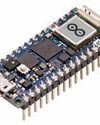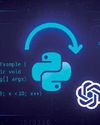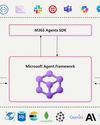Intentar ORO - Gratis
ChatGPT: It's Easy To Poison This AI Model
Open Source For You
|August 2023
ChatGPT is still fragile and needs to be used with care. You can hoodwink it into thinking it is giving you information for the right reasons, and in the process, make security systems vulnerable.

Artificial intelligence has revolutionised several industries, including cyber security, where it has improved security breach detection and prevention. This has been demonstrated by the chatbot ChatGPT, although subsequent abuses of the bot have raised questions about its ability to hurt in unanticipated ways. ChatGPT has been successfully poisoned by attackers. The potential for an AI-assisted kill chain is examined in this article along with the corresponding security risks.
OpenAI came up with the chatbot ChatGPT based on the architecture of GPT-3, a large multimodal model used to respond to follow-up queries, admit mistakes, dispute false premises, and more. ChatGPT is also known as GPT3.5 since it is fine-tuned to answer most queries and continue conversations, as shown in Figure 1.
Following its introduction, many people rapidly began using ChatGPT for a variety of tasks, from writing articles to creating social media posts and captions. It provides suitable replies in a conversational style using deep learning algorithms to comprehend the context and meaning of text input. This model can comprehend a wide range of topics and circumstances because it was trained on a huge data set of online content.

Esta historia es de la edición August 2023 de Open Source For You.
Suscríbete a Magzter GOLD para acceder a miles de historias premium seleccionadas y a más de 9000 revistas y periódicos.
¿Ya eres suscriptor? Iniciar sesión
MÁS HISTORIAS DE Open Source For You

Open Source For You
Lux: Excellence in Data Analysis and Visualisation
Data is sacred in today's world, and Python libraries like Lux make data analysis and visualisation so much easier.
2 mins
January 2026

Open Source For You
The Role of Open Source in Building Modern Data Infrastructure
It's no secret that open source is emerging as the backbone of modern data infrastructure. Here’s a list of the core open source technologies used to deploy this infrastructure, along with some real-world examples and a brief on why open source matters.
3 mins
December 2025

Open Source For You
The Whispering Machines: How Open Source is Bringing Intelligence to the Tiniest Devices
Built on open source frameworks, TinyML is enabling complex machine learning models to run on the microcontrollers embedded in connected devices, bringing artificial intelligence to the very edge of the network.
3 mins
December 2025

Open Source For You
Setting Up Snort to Secure Your Network
Snort is a popular, open source intrusion detection system that monitors traffic in real time to detect malware. Here’s a detailed explanation of how to set it up on Ubuntu and test it by generating traffic from another system.
7 mins
December 2025

Open Source For You
When AI Meets DevOps to Build Self-Healing Systems
Traditional DevOps, with its rule-based automation, is struggling to work effectively in today’s complex tech world. But when combined with AlOps, it can lead to IT systems that predict failures and solve issues without human intervention.
7 mins
December 2025

Open Source For You
How to Automate Java Code Modernisation
This short guide illustrates that automating Java code modernisation with Python and OpenAI API is not just possible-it's remarkably effective.
5 mins
December 2025

Open Source For You
The Quest to Build a Quantum Computer
The road to large-scale quantum computing is long and hard, with incremental advances paving the way. But the destination is in sight.
12 mins
December 2025

Open Source For You
Job Opportunities: What's Hot in the Cloud Space?
If there's one field that refuses to slow down, it's cloud computing. Even as automation and AI reshape roles, cloud adoption continues to surge. From startups deploying microservices overnight to enterprises migrating decades of legacy systems, cloud remains the engine of digital transformation. For professionals, this means one thing: skills that live in the cloud won't come down anytime soon.
2 mins
December 2025

Open Source For You
Securing Client Identity with Post-Quantum Cryptography
Here's a quick tutorial on how to build a secure, real world client-server model that establishes client identity by using CRYSTALS-Dilithium, a post-quantum cryptography algorithm.
3 mins
December 2025

Open Source For You
Unlocking the Power of Multi-Agent Solutions with the Microsoft Agentic Framework
The Microsoft Agentic Framework is rapidly emerging as a cornerstone for developers, architects, and technology leaders seeking to build dynamic, intelligent systems powered by multiple collaborating agents. In an era where automation, distributed intelligence, and adaptive software are increasingly vital, this framework offers robust tools and features to accelerate the design and deployment of agent-based solutions.
6 mins
December 2025
Translate
Change font size

